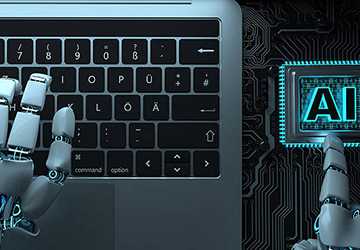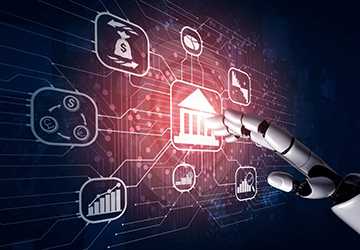Recent Advances and Applications of Artificial Intelligence
Imagine a place where your doctor can predict your condition before you feel sick, your car can take you to work, and your shopping experience can be tailored to you. Artificial intelligence (AI) has evolved from science fiction to a tangible force transforming every aspect of our lives.

Since its inception, AI has come a long way, from simple machine learning models to complex systems that can perform tasks that once required human intelligence. The importance of AI in modern society cannot be overstated, as it drives innovation and efficiency in many fields. This article looks at the latest advances in real-world AI applications and their applications across industries.
Artificial Intelligence in Healthcare
Artificial intelligence (AI) has made tremendous progress in healthcare, redefining how doctors diagnose, treat, and care for patients. By incorporating AI technology into multiple medical fields, we can achieve more accurate diagnoses, personalized treatments, and better patient outcomes.
Medical Imaging
AI in healthcare means that their systems can now interpret medical images such as X-rays and MRIs more accurately and quickly than human radiologists. This ability to detect early can lead to timely treatment and better patient outcomes. AI in medical imaging improves diagnostic accuracy and minimizes the burden on healthcare workers, allowing them to focus on more challenging patients.
Take breast cancer detection, for example. AI systems have been shown to detect cancerous lesions in mammograms with accuracy comparable to that of experienced radiologists. Patients can receive faster, more reliable diagnoses, even in understaffed or busy environments.
Personalized Medicine
AI analyzes genetic information and medical history to help tailor treatments to individual patients. This approach not only makes treatments more effective but also minimizes side effects. Personalized medicine is essential for more targeted healthcare, improving patient outcomes and satisfaction.
Consider how AI in healthcare can analyze giant databases of patient medical histories to predict how new drugs affect different populations. This predictive ability means fewer side effects and more effective treatments. It's like having a medical crystal ball.
AI in Transportation
Travel is another real-world AI application. Artificial intelligence (AI) makes travel safer, more efficient, and more autonomous. AI lays the foundation for a more convenient, seamless future, from self-driving cars to advanced traffic management systems.
Self-driving cars
AI is also impacting transportation, mainly through the development of self-driving cars. These vehicles use AI to navigate roads, avoid obstacles, and keep passengers safe. Beyond cars, AI can optimize urban traffic management systems, reduce congestion, and improve public transportation. Incorporating AI into transportation can reduce traffic accidents, make travel more efficient, reduce urban congestion, and make cities more intelligent and livable.
Real-world AI applications for Tesla and Waymo include the development of self-driving vehicles that can handle most driving situations. This technology is expected to make roads safer and provide mobility solutions for people who cannot drive themselves, such as the elderly or disabled.
Logistics
AI optimizes delivery routes, reduces fuel consumption, and ensures faster deliveries. Additionally, AI-controlled drones are being tested for delivering various goods, including medical supplies and food. These advances streamline logistics and make supply chains more efficient and responsive.
Think about how companies like Amazon are experimenting with drone deliveries. Using real-world AI applications to determine the fastest and most efficient delivery routes, these drones can deliver packages to customers in record time, reducing the need for human drivers and reducing traffic.
AI in Finance
AI has also significantly strengthened the financial sector due to its better security features and improved customer relations. Using AI technology, financial institutions can provide more reliable services and better protect customers from fraud.
Fraud Detection
In the banking industry, AI can detect fraud and provide customer support. AI technology can detect and prevent fraudulent activities by examining real-time transaction patterns. This feature improves security and protects financial institutions and their customers from fraud.

For example, if you make a purchase that is different from your usual spending habits, algorithms and real-life AI applications may flag it as suspicious. This instant detection helps banks quickly prevent potential fraud, saving millions of dollars each year.
Customer Service
AI-powered chatbots provide 24/7 customer support and handle inquiries quickly and accurately. By leveraging real-world AI applications, financial institutions can improve customer experience and build trust and efficiency in their operations.
Chatbots like Bank of America's Erica are becoming more common. These virtual assistants help customers manage their accounts, answer questions, and provide financial advice. They reduce wait times and provide consistent, reliable service.
AI in Retail
The retail industry is undergoing a revolution with the help of AI, which is improving the overall shopping experience and streamlining inventory management. By analyzing customer data and automating warehouse processes, AI makes online and in-store purchases more personalized and efficient.
Personalized Shopping
Real-world AI applications are also transforming the shopping experience through personalized shopping. Online retailers use AI to analyze customer behaviour and preferences and provide tailored product recommendations. AI can help manage inventory in physical stores by notifying employees when items are out of stock and even using AI-powered robots to restock shelves.
Consider how Netflix and Amazon use AI to recommend movies and articles based on your viewing and purchasing habits. This tailored strategy improves the customer experience and increases sales by showing items that customers are more likely to buy.
Warehouse Management
Smart shelves can alert employees when items are out of stock, and AI robots can restock shelves to ensure that products are always available to customers. These innovations help retailers maintain optimal inventory levels and improve the shopping experience.
For example, Walmart uses AI to track inventory levels in real-time and predict which products must be restocked before selling out. These efficiencies keep shelves stocked, reduce waste, and improve supply chain management.
AI in Entertainment
AI opens up new creative possibilities while improving the interactive and entertaining aspects of the entertainment industry, from producing unique music and scripts to recommending content that matches personal preferences.
Content Recommendation
Streaming services like Netflix and Spotify use AI to recommend shows, movies, and music that suit our tastes. Thanks to the continuous improvement of AI algorithms, these recommendations are improving.
These algorithms analyze what you've seen or heard and suggest new content that fits your tastes; this keeps users engaged and helps them discover new favourites, making the user experience more enjoyable.
Content Creation
Real-world AI applications also extend to content creation. The creative possibilities are expanding from AI-generated music to TV show scripts. Even video games use AI to create more immersive, responsive experiences for players.
Let's take AI-generated music as an example. Platforms like AIVA create original music for movies, video games, and commercials. This technology enables unique, custom compositions that push the boundaries of creativity.
Conclusion
AI is transforming every industry, providing new opportunities and increasing efficiency while reducing costs. From healthcare to retail, the fields of AI application are numerous and growing. While there are challenges to overcome, the potential benefits are enormous. As we continue to explore the possibilities of AI applications in real life, it's essential to understand and consider the broader impact of these technologies. Artificial intelligence is here to stay, and its influence will only grow in the coming years.
Related Posts
- Tips to Protect Your Online Privacy
- 10 Must-Have Gadgets for Every Tech Enthusiast in 2023
- The Path Ahead for Renewable Energy Technology
- 6 Tips for Resolving Slow Internet Speeds at Home
- Top 10 Artificial Intelligence Tools for Business Automation
- 4 Features of AI-Enhanced Video Editing Tools for Creators